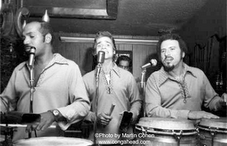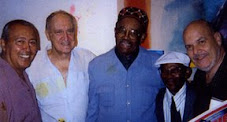 Vincent Livelli, far right, in 1948 at the Embassy Club, Plaza San Martin, Buenos Aires
Vincent Livelli, far right, in 1948 at the Embassy Club, Plaza San Martin, Buenos AiresUnless one arrives in a foreign country with letters of introduction, it is necessary to form new friendships and new experiences on your own.
In 1948, I showed up in Buenos Aires with plenty of friends whom I had met aboard the SS Argentina. Furthermore, these new friends were all high society. For example, Luiz Herrera, the world polo champion and race-car driver, who was the Maradona of his day, when polo was what soccer is today in Argentina. Also Samuel Jankelovitch, Evita’s impresario, and the Urquiza family, like our Kennedy clan. These folks met me at the dock in their Cadillacs when I would return to Buenos Aires, at a time when importing foreign cars was illegal. It was also a time when, since the British had built the nation’s railroads, the sight of British tweed jackets, cravats and English Leather cologne was in evidence everywhere. Within this circle of companions, in a hospitable country, I felt comfortably ensconced…that is, until I recently read the book Tango: The Art History of Love, by Robert Farris Thompson.
Where I had always received a warm Buenos Aires welcome, had I arrived cold, my present memories of those days would be quite different.
I was hanging out with the wrong crowd, listening to white (chongo) tangos of Carlos Gardel and frequenting clubs with the aristocratic atmosphere of the 1940s tango del salon. Forever in the upper-crust company of politicos and shifty club owners, I stayed at fancy hotels such as the Plaza, across from the Embassy Club on Plaza San Martin, owned by a Señor Kootcher. His elegant club was where we danced and dined, dressed tenue de soiree, on my nightclub tour of Buenos Aires that included a stop at the La Querencia club for some gaucho entertainment (malambo zapateado) and ending at the Gong for Americanized Argentine jazz. After the tour, I would finish off the evening at Cabaret Tabaris. This club was balconied and had a telephone at each table, which allowed you to connect with attractive unescorted ladies—and idea borrowed from European clubs.
Until I read Prof. Thompson’s Tango, I was unaware that there was another Argentina, where tango is to its citizens what rumba is to Cubans. During the time I lived in Havana, Cuban society was already beginning to more openly accept Afro-Cuban talent, whereas Argentina during that era of more British-influenced mores, was hiding the African origins of its national dance—its beating heart.
True, there were districts in Buenos Aires that were equivalent to the solares, patios and bateys of Havana, but I never knew of them. Never did I see Afro-influenced canyengue tango, where the male partner’s knees are bent with his torso pushed forward (this style is similar to Killer Joe’s hot rumba as he showed it to us at the Palladium). Nor did I enjoy black malambo, a dance of ritual purification that, like teeza maza, features explicit foot stomping as part of the tango. I never knew the ki-kongo power that drives the tango. I would not have feared entering the La Boca district, the city’s inner port with its bars and brothels, where tango was born.
Like being in love, faithful to one woman all my life, I only knew Afro-Cuban cultures, until I read that tango was born of the same mother: Mother Africa. Now my vocabulary includes yumba (“God’s command”), mufa (“bad luck”), mayembo (“trembling shoulders”) and other words added to my Afro-Cuban abrecuto quri dinga and babarabatibi coibi, etc.
Where I easily found Africa in Belize, not to mention Haiti or Boriqua, I feel I was cheated of memories that would today take me, like those I have of Cuba, to darkest Africa—the darker and hotter, the better.


1 comment:
Vincent
Thanks for your letter. As to your question,yes, I have read Sublette's book,and quoted it on the radio. I took a look at your blog today, and saw you were born in Greenwich Village. How ironic, that most of the jazz,and many Latin jazz bands can be heard today in Greenwich Village clubs .That is where I used to see Tito Puente's band.
Best Regards ,
Danny Garcia
KJAZ 98.1.FM
http://www.xanga.com/kjazfm
Garcia's Latin Grooves Monday-Friday 6-8PM
Bermuda Blues
Saturdays 10AM-2PM
Downbeat Jazz 2-6 PM Sunday
http://www.xanga.com/BermudaBlues
P.O.Box SN 280
Southampton SN BX
Bermuda
bdamusic@gmail.com
http://www.myspace.com/garciasgrooves
Post a Comment